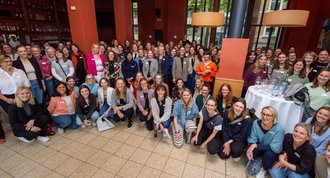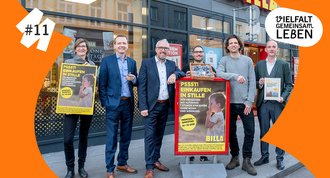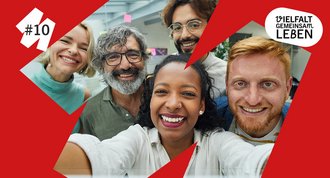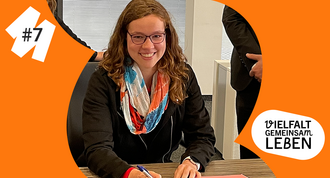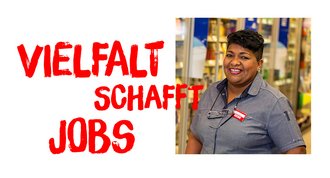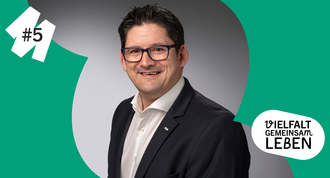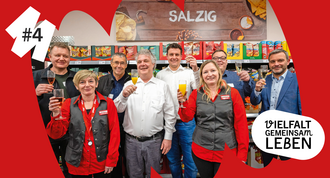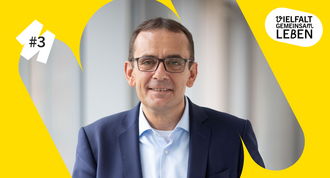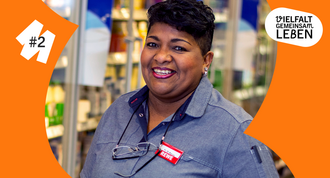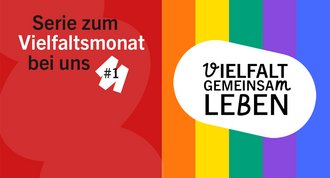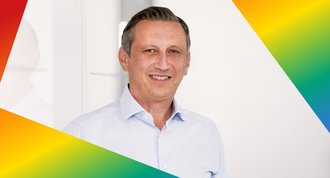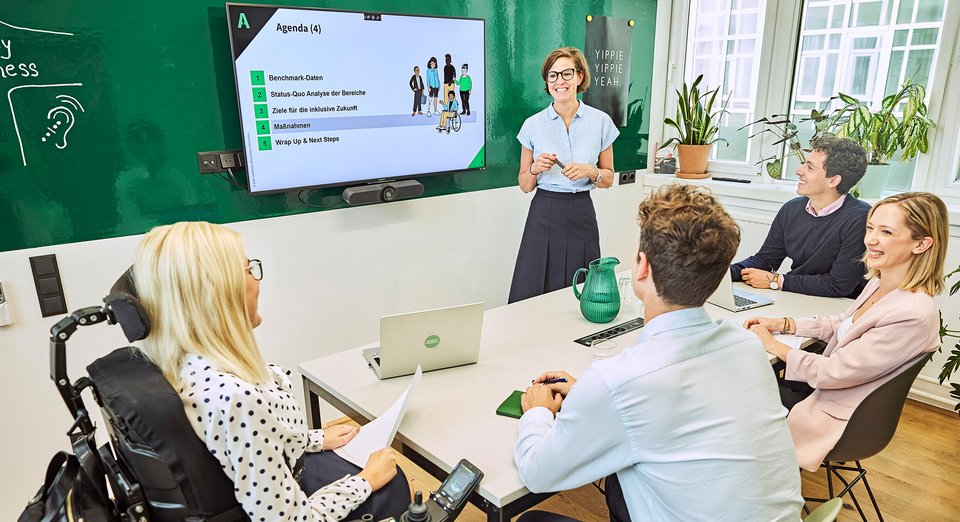
The REWE Group participates in myAbility Talent, which provides internships in companies for young academics with severe disabilities. Charlotte Ehl, who brings interested departments and potential interns together, knows what the programme is all about, how to break down inhibitions and why doorsteps are not really a problem.
one: Charlotte, what is myAbility? What is the idea behind it and where do we come in?
Charlotte Ehl: myAbility is a social enterprise from Austria that advises interested companies and organisations on all aspects of inclusion and accessibility for people with disabilities. The primary goal is to achieve equal opportunities for people with disabilities in business, but myAbility also wants to promote inclusion and acceptance of people in general. 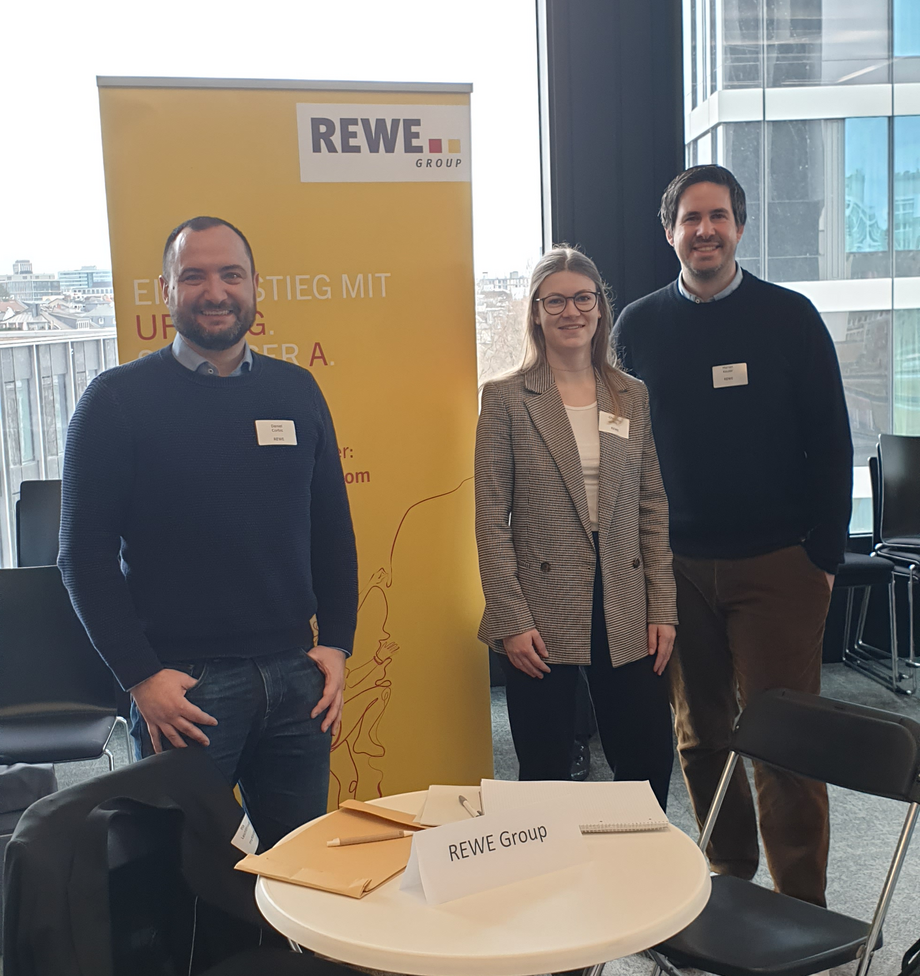 Koordinieren das Programm: Daniel Corbic, Charlotte Ehl und Marian Keuler (v.l.).
With our project, we are part of myAbility Talent, which is a talent programme for prospective academics, i.e. for well-educated young people with disabilities who are currently studying or have completed their studies. They would like to get a taste of the corporate world through an internship or job shadowing or are looking for a job.
Koordinieren das Programm: Daniel Corbic, Charlotte Ehl und Marian Keuler (v.l.).
With our project, we are part of myAbility Talent, which is a talent programme for prospective academics, i.e. for well-educated young people with disabilities who are currently studying or have completed their studies. They would like to get a taste of the corporate world through an internship or job shadowing or are looking for a job.
myAbility builds up a talent pool for this purpose, and we as a participating company can get to know the talents personally in advance and see whether and where these talents fit in with us. And then, as a project team, we start looking for an internship within the company.
one: These are young academics with disabilities. What types of disabilities can they have?
Charlotte Ehl: These young, well-educated people all have a degree of disability (GdB) of 50 or more. Of course, this could be someone who is visibly dependent on a wheelchair and requires a certain degree of accessibility. But it can also be someone who has a degree of disability due to cancer or a mental illness that you can't see.
one: Do departments that are interested in the programme have to be barrier-free?
Charlotte Ehl: That depends. For people in wheelchairs, accessibility must of course be checked in advance, but that can all be clarified in dialogue. Especially as the talents themselves know and can formulate what exactly they need. Some have an accompanying person, for whom there must of course also be room in the office. In the case of people with mental illnesses, it is also important to clarify what needs the person has, for example whether they need a particularly quiet working environment.
„Every department has had interns. And it's not much different with myAbility interns.“

one: So should interested departments think about door widths or thresholds in advance?
Charlotte Ehl: My advice is that anyone who is interested should get in touch. If you approach it with an open mind, you've basically already fulfilled the most important prerequisite. And we have a lot of expertise within the company for all detailed questions, including our occupational safety specialists, our Inclusion Officer Roland Kraemer and, in particular, the representatives for the severely disabled... So before you say: 'Can't do it, the door is too narrow', you should see what is possible.
one: Beyond openness, what else does a department need to bring to the table when taking on an intern from the myAbility talent programme?
Charlotte Ehl: I think it's good that you say intern and trainee. Because regardless of whether someone has a disability or not, every department has certainly had experience with interns and knows that every internship has to be organised in advance. Work equipment must be made available, tasks must be considered and a permanent contact person must be selected. The same applies to a person with a disability: they need tasks, work equipment and support. Every department has certainly had interns, and it's not much different with myAbility.
one: Many of our colleagues are working from home at least some days, so not everyone is always there. Is it still possible?
Charlotte Ehl: Yes, that's not a problem at all. We started myAbility in the middle of the coronavirus pandemic, with virtual job shadowing for one or two days. That wasn't a problem.
one: What tips do you have for me if I've never had any contact with people with disabilities in my department?
Charlotte Ehl : We from the project team, Daniel Corbic, Marian Keuler and I, are happy to answer any questions. The important thing is simply the openness I mentioned earlier and a fundamental interest in the topic of inclusion and in people. You should be keen to get involved and be willing to learn. We offer the eLearning programme "Making the unconscious conscious", because the fear of doing something wrong is often the biggest barrier.
one: How do internships and interns find each other?
Charlotte Ehl: Anyone who reads this article is very welcome to get in touch with us from the project team and we'll make a note of you. Otherwise, we will first get to know all the talented people who are interested in REWE Group and see which specialist areas would be particularly exciting for them. In the next step, we approach these departments, if they have not yet contacted us themselves, and ask whether they would like to offer an internship. If so, we bring the department and intern together for an introductory meeting. If it's a good fit, it's great, then the internship can take place. But the department is under no obligation.
„Young people with disabilities are also "just" people looking for a permanent job.“

one: Last question: What do we as a company, as a department, gain from having interns with severe disabilities join us?
Charlotte Ehl: We benefit on several levels. Firstly, on a personal level. Each of us can learn a lot from it. I've spent a lot of time dealing with inclusion this year, including as part of the myAbility talent programme, and have learned a lot as a result. Above all, that these young people are also "just" people looking for a permanent job and professional recognition.
As a company, we have an interest in being diverse. As REWE Group, we promote diversity and explicitly inclusion - and of course we are simply interested in attracting talent. And whether talents have a severe disability or not, talents are first and foremost talents. As an organisation, we need new ideas and new perspectives. And people with severe disabilities in particular, who have already overcome many challenges in their lives, enrich our approach to issues and problems with different perspectives. And as a specialised department, you can grow if you allow these talents to participate in your own work and knowledge. Last but not least, it's fun to give someone a chance.
Another thing that is important to me is that most disabilities are not congenital, but are acquired over the course of a lifetime. So anyone who deals with the topic always takes something away with them and also benefits from it in their private life."
More information is available from Charlotte Ehl, HR development expert at REWE Group's Cologne Central locations, on the myAbility page inside.
An internship can last from a few weeks to several months, during which the intern works on their own tasks under close supervision where possible. Job shadowing is a type of on-the-job training in which a colleague is accompanied in their job for one or two days.

